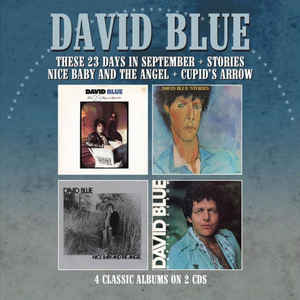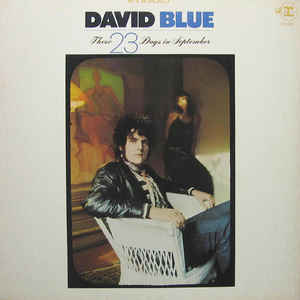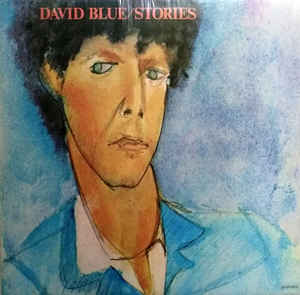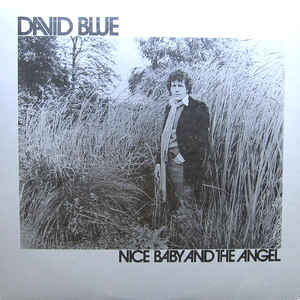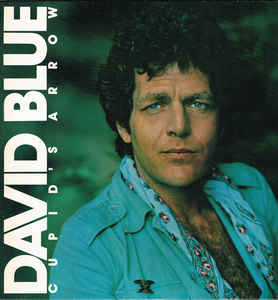DAVID BLUE : THESE 23 DAYS IN SEPTEMBER / STORIES / NICE BABY AND THE ANGEL / CUPID'S ARROW
Disc 1
THESE 23 DAYS IN SEPTEMBER
- These 23 Days In September
- Ambitious Anna
- You Need A Change
- The Grand Hotel
- The Sailor's Lament
- You Will Come Back Again
- Scales For A Window Thief
- Slow And Easy
- The Fifth One
Release Date : 1968
Length : 36:46
Review (AllMusic) : If Blue's second album was not nearly as much of a cultural artifact as his 1966 Elektra debut, which went to embarrassing extremes in its Bob Dylan imitation, it was of greater artistic merit. Most importantly, Blue sang far better, though he still wasn't a great singer, with far fewer of the glaringly off-key notes that had bedeviled his first LP. As both a singer and songwriter, he was still Dylanesque, but was becoming far more his own man, as a world-weary commentator with a growing country influence. Certainly the title song far outstrips anything on David Blue, sounding something like a combination of Dylan and early Leonard Cohen, its haunting minor melody enhanced by judicious touches of accordion and sitar. Nothing else on the record is as affecting, and some of it's rather pedestrian, minor Dylanesque stuff, in fact. But it's not obnoxious, and sometimes the music's rather good, as in "Ambitious Anna," which like some of the other tracks have a border feel. On such tunes, Blue seems like a peer or even slight antecedent to somber cowboys like Townes Van Zandt. The remake of "The Grand Hotel," a highlight of his first album, is sung better here, but has a sparer, less interesting arrangement.
STORIES
- Looking For A Friend
- Sister Rose
- Another One Like Me
- House Of Changing Faces
- Marianne
- Fire In The Morning
- Come On John
- The Blues (All Night Long)
Release Date : 1972
Length : 36:03
Review (AllMusic) : With his fourth album, Stories, David Blue joined Asylum Records, the label headed by David Geffen that had been set up to shelter singer/songwriters like Jackson Browne. For Blue, it was another welcoming home after stints at similarly artist-friendly Elektra and Reprise, and Stories was a continuation of his explorations of the personal relationships of sensitive people. The opening song was called "Looking for a Friend," and that was a good introduction to an album that was about the ups and downs of friendship and the loneliness that sets in when friends are not around. Musically, the album was divided between its two LP sides, each containing four songs. On the first four, the arrangements tended to be limited to two acoustic guitars, while the second half used more extensive instrumentation, including Pete Jolly's accordion on "Marianne," the piano-with-strings "Fire in the Morning" (the chart done by Jack Nitzsche), the full-on rock band playing on "Come on John," and piano/organ folk-rock for "The Blues (All Night Long)," with Ry Cooder adding slide guitar. Blue's lyrical reflections, expressed in his matter-of-fact baritone, touched on experiences that ranged from temporary romantic contentment to suicidal urges. "It wasn't easy, when I think about it/Living in the house of changing faces," he sang in the chorus of "House of Changing Faces," "I still have the tracks to remind me what life was like, high and wasted/When I wanted to die." That wasn't the only song to allude to drug use. The most explicit was "Come on John" (previously recorded by Helen Reddy), a cautionary tale for a friend that left little doubt about its subject when it began, "I've got a friend with a habit/A habit of runnin' away/He says he can't take it/But he takes it every day." Musically, the song had the feel of Bob Dylan's "Ballad of a Thin Man," but for once Blue didn't sound so much like Dylan on Stories as he did like Leonard Cohen. In fact, there was one song that might have been a direct response to Cohen. It's hard not to at least speculate that "Marianne" may share a subject with Cohen's "So Long, Marianne," particularly because of the musical similarity and because of the lines "I knew her from another song her older poet, he'd wrote before/We played in the morning, laughing on the floor/Till he came a-knocking on the Lower East Side door." Although Blue, too, seemed not have stayed with her, he made a point of countering Cohen's farewell, singing in the chorus, "Do not cry, you have helped me, I will not say goodbye." Whether or not this is the same Marianne, however, she is another friend described by Blue in a series of songs about a community of companions who love and lose each other, yet whatever their fates, he seemed grateful to them all. [Rhino's Wounded Bird subsidiary reissued Stories on CD in 2006.]
Disc 2
NICE BABY AND THE ANGEL
- Outlaw Man
- Lady O' Lady
- True To You
- On Sunday, Any Sunday
- Darlin' Jenny
- Dancing Girl
- Yesterdays Lady
- Nice Baby And The Angel
- Troubadour Song
- Train To Anaheim
Release Date : 1973
Length : 35:08
Review (AllMusic) : David Blue, whose song publishing company is called Good Friends Music, has always relied on his fellow musicians, many of them more prominent in the record business than he is. His most prominent musical friend on his fifth album, Nice Baby and the Angel, is Graham Nash, who produced the disc in addition to singing background vocals and playing acoustic guitar and electric piano. Nash's influence has made for a fundamental change in musical style for Blue, whose previous efforts harked back to '60s folk and folk-rock. Not so Nice Baby and the Angel. Under Nash's aegis, and with sidemen including guitarist Dave Mason and multi-instrumentalist David Lindley, and additional background singers Mason, Glenn Frey of the Eagles, and Jennifer Warren, Blue is brought into the Southern California rock fold of country-inflected singer/songwriter music à la Crosby, Stills, Nash & Young and Jackson Browne. The changeover is apparent right at the start with the rocking leadoff track "Outlaw Man." (The song was quickly taken up by the Eagles as appropriate for their Desperado concept album and released by them as a singles chart entry, giving Blue his biggest payday.) Mason makes himself felt right away with an electric guitar solo that runs right through the song. Anchored by Nash's keening tenor, the background vocals considerably sweeten this and other songs. Another potential single is "True to You," which is reminiscent of the First Edition hit "But You Know I Love You," while the catchy "Darlin' Jenny" makes lots of room for Lindley's slide guitar work. There are a few tracks on the LP that hark back to Blue's earlier style, the first of which is "On Sunday, Any Sunday," which features an arrangement for two acoustic guitars augmented by Lindley's violin and viola and Terry Adams' cello. "Yesterday's Lady" and "Troubadour Song" boast similar instrumentation, and the latter in particular is more characteristic of the old Blue with its downcast, introspective lyrics. Otherwise, Blue's words are somewhat less personal and involved than usual, although his outlook is much the same as ever, expressing the views of a lonely, sensitive man who encounters love but doesn't retain it. As he puts it in the album-closing "Train to Anaheim," "I'm still on the road/I can't be satisfied." Thanks to Nash, Nice Baby and the Angel dresses such sentiments in highly accessible musical garb that may make it easier for a larger audience to appreciate. [Rhino's Wounded Bird subsidiary reissued the LP on CD in 2006.]
CUPID'S ARROW
- Run, Run, Run
- The Ballad Of Jennifer Lee
- Tom's Song
- I Feel Bad
- Cordelia
- Maria, Maria
- Cupid's Arrow
- Primeval Tune
- She's Got You
Release Date : 1976
Length : 38:28
Review (AllMusic) : Singer/songwriter David Blue has tended to be well supported by talented studio musicians on his string of albums, of which this is the seventh in ten years. Here, he boasts a backup band as good as any he has used in the past: Jesse Ed Davis on lead guitar, producer Barry Goldberg on piano and organ, Auburn Burrell on pedal steel and rhythm guitar, Donald "Duck" Dunn of Booker T. & the MG's on bass, and Levon Helm of the Band (or Michael Baird) on drums, with David Lindley adding mandolin, slide guitar, and violin. The playing gives him more of a rock sound than he has used before, although the musicians are versatile enough to give the leadoff track, "Run, Run, Run," a lilting Southwestern/Mexican feel to go along with its lyrics about the Santa Ana winds and the lights of Santa Fe, and to negotiate a reggae rhythm on "Maria, Maria." More typical, however, is "Tom's Song," a sinuous rocker that recalls the Eagles' "One of These Nights." But as the musical content of Blue's records has become more accessible and accomplished, his songwriting has tended to take more of a backseat, and his monotonic singing has remained only adequate. Here, the songs have interesting lines as they tell their tales of love and loss, but they are not as effective on the whole as Blue's earlier work.
Label : Morello Records
Release Year : May 15, 2020
Review : David Blue was born on 18th February 1941. He wasn't born David Blue, of course, but Stuart David Cohen and he came from Providence, Rhode Island. He moved to Greenwich Village in the early '60s and one day saw Bob Dylan writing the song that would become the great folk anthem 'Blowin' In The Wind'. Bob asked David to play the chords while he would create the verses. It was performed that night at Gerde's Folk City. Once Bob Dylan made it, record companies came looking around Greenwich Village for potential artists. However, there was already a Dave Cohen performing in the village, who later joined Country Joe and the Fish. Our Dave Cohen told folk singer Eric Andersen that he would have to change his name and Eric said, "You've got such blue eyes. You should be David Blue". When Dylan heard of his new name, he started laughing and sang "It's all over now, David Blue". When Bob Dylan had his motor cycle accident in 1966, David Blue sent him a note "It's been done already" - a reference to James Dean. While Bob was recovering, he was recording with the band and David can be seen on the cover of The Basement Tapes - he is sitting to the right of Mrs Henry. The Reprise album, "These 23 Days In September" was released in 1968. It was produced by Gabriel Mekler who was producing Steppenwolf. Gabriel played piano and Bob Rafkin, guitar. His first album for the newly-formed Asylum label - "Stories" (1972) - had a self-portrait on its cover. The album featured some magical slide guitar from Ry Cooder. The musicians on the album include Rita Coolidge, Chris Ethridge, Milt Holland and Russ Kunkel, which is pretty much an A-Team. Graham Nash, then a superstar with Crosby, Stills and Nash, produced the album "Nice Baby And The Angel" in 1973. Background vocals included Graham Nash, Dave Mason, Glenn Frey and Jennifer Warren. Glenn Frey was so taken with the track 'Outlaw Man' that he took it to The Eagles and it was featured on their album "Desperado". "Cupid's Arrow" released in 1976 was produced by Barry Goldberg and featured Jesse Ed Davis and the Liverpool musician Jackie Lomax. The title track was written about protest singer Phil Ochs and it was sung at his memorial concert.
Review (Amazon) : US Singer Songwriter David Blue has finally been recognized as a great writer of meaningful songs. This 4 CD set of most of his Asylum releases is well worth the effort and with great support from the likes of David Lindley, Ry Cooder, Graham Nash, Glen Frey ( David Blue wrote Outlaw Man covered by the Eagles) - you will ask yourself " how did I miss these great albums when they first came out.....but I'm so glad I can now her them all in one place now"
